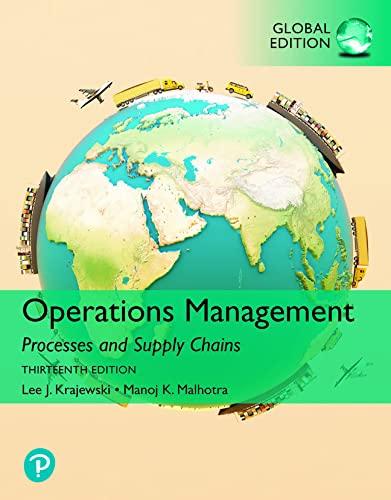Question
Sam's Cat Hotel works 52 weeks out of each year, 6 days of the week, and utilizations a constant audit stock framework. It buys kitty
Sam's Cat Hotel works 52 weeks out of each year, 6 days of the week, and utilizations a constant audit stock framework. It buys kitty litter for $11.70 per sack. The accompanying data is accessible about these packs.
Request = 90 sacks/week
Request cost = $54/request
Yearly holding cost = 27% of cost
Wanted cycle@service level = 80%
Lead time = 3 weeks 118 working days2
Standard deviation of week by week interest = 15 packs
Current close by stock is 320 sacks, with no open requests or delay purchases.
a. What is the EOQ? What might be the normal time between orders (in weeks)?
b. What should R be?
c. A stock withdrawal of 10 packs was simply made. Is it an opportunity to reorder?
d. The store presently utilizes a ton size of 500 sacks (i.e., Q = 500). What is the yearly holding cost of this approach? Yearly requesting cost? Without computing the EOQ, how might you close from these two computations that the current parcel size is excessively huge?
e. What might be the yearly expense saved by moving from the 500-sack parcel size to the EOQ?
A rancher should conclude whether to make a defensive move to restrict harm to his grapefruit crop if the overnight temperature tumbles to a level well beneath freezing. On the off chance that the temperature drops too low he risks losing his whole yield, esteemed at $75,000. In view of the National Weather Service, the likelihood of such a temperature drop is 60%. He can protect his harvest by splashing water on every one of the trees, which will cost $20,000. This activity may prevail with regards to securing the yield, with the accompanying potential results:
Likelihood
Harm
0.30
$0
0.15
$5,000
0.10
$10,000
0.15
$15,000
0.30
$20,000
a. Develop a choice tree to help the rancher settle on his choice. How would it be a good idea or him to respond?
b. Track down the greatest expense of protecting the grapefruits for which the rancher likes to protect his harvest.
c. Assume the rancher is dubious about the unwavering quality of the National Weather Service estimate. On the off chance that he thinks the likelihood of a freeze happening could be anyplace somewhere in the range of 40% and 80%, would that alter his perspective?
Occupation Costing Johnson Inc. is a task request fabricating organization that uses a foreordained overhead rate
in light of direct work hours to apply overhead to singular positions. For the current year, assessed direct work
hours are 95,000 and assessed industrial facility overhead is $617,500. The accompanying data is for September
of the current year. Occupation A was finished during September, and Job B was begun however not wrapped up.
[LO 4-3, 4-4, 4-5]
September 1, Inventories
M13M
Materials Inventory $ 7,500
Work-in-Process Inventory (All Job A) 31,200
Completed Goods Inventory 67,000
Material buys 104,000
Direct materials ordered
Occupation A 65,000
Occupation B 33,500
Direct work hours
Occupation A 4,200
Occupation B 3,500
Work costs brought about
Direct work ($8.50/hour) 65,450
Circuitous work 13,500
Administrative pay rates 6,000
Rental expenses
Production line 7,000
Regulatory workplaces 1,800
Absolute hardware deterioration costs
Manufacturing plant 7,500
Regulatory workplaces 1,600
Circuitous materials utilized 12,000
Required
1. What is the absolute expense of Job A?
2. What is the all out processing plant overhead applied during September?
3. What is the overapplied or underapplied overhead for September?
Step by Step Solution
There are 3 Steps involved in it
Step: 1
Here are the solutions to the questions a Sams Cat Hotel 1 EOQ 2RCH 29011702754 73 sacks Time betwee...
Get Instant Access to Expert-Tailored Solutions
See step-by-step solutions with expert insights and AI powered tools for academic success
Step: 2

Step: 3

Ace Your Homework with AI
Get the answers you need in no time with our AI-driven, step-by-step assistance
Get Started


